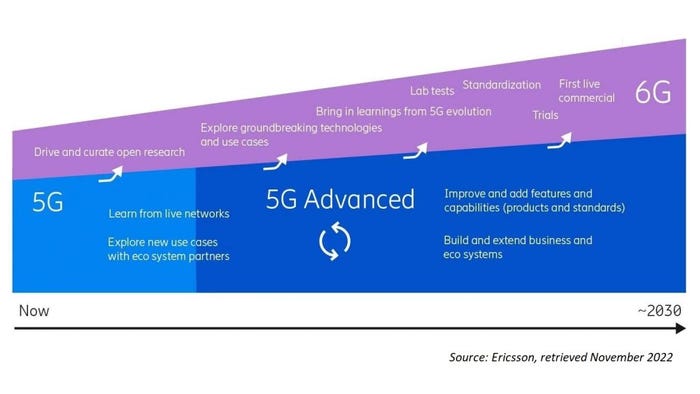Swedish kit maker Ericsson has unveiled plans to add the UK to its growing footprint of 6G R&D locations.
November 22, 2022

Swedish kit maker Ericsson has unveiled plans to add the UK to its growing footprint of 6G R&D locations.
The company on Tuesday announced it will invest tens of millions of pounds over the next 10 years in a new unit that will employ 20 researchers, and offer support to PhD students working alongside other academics as well as telcos and other industry partners. The aim is to conduct research projects that ultimately contribute to the global development of 6G. Focus areas include network resilience and security, AI, cognitive networks, and energy efficiency.
6G is being touted as being capable of offering – once it actually exists – speeds that exceed 1 Tbps. Achieving this over a cellular connection will require even more spectrum than is being used today. To this end, the US Federal Communications Commission (FCC) has already opened up the 95 GHz-3 THz band for experimental use. But maximum throughput is only one piece of the puzzle. If 6G is going to deliver on the industry’s vision of truly blending the physical world with the digital, there are a lot of other pieces to put in place. Despite the mountain of work ahead, Ericsson reckons the first commercial 6G networks will begin rolling out in the early 2030s.
“Ericsson is at the forefront of global research, innovation and developing open standards that will underpin a future of limitless connectivity and new technologies. Establishing a research programme in the UK means the country will be well positioned to utilise its existing high international level of knowledge in wireless systems and technologies to produce ground-breaking 6G research that not only can help shape the future of global standards but also deliver a more connected, efficient and sustainable society,” said Magnus Frodigh, VP and head of Ericsson Research, in a statement.
The UK government is understandably pleased with Ericsson’s pledge and the attention that comes with it.
“Ericsson’s investment is a huge vote of confidence in the UK’s innovative telecoms sector. This pioneering research unit will create new jobs, support students and bring together some of our country’s finest minds to shape the future of telecoms infrastructure in the UK and across the globe,” said DCMS Secretary of State Michelle Donelan.
“This new investment underlines our ongoing commitment to ensure the country remains a global leader in the technologies and industries of the future,” added Katherine Ainley, CEO of Ericsson UK and Ireland. “Our vision for a more connected, safer and sustainable world is one that is shared by the UK government, and we look forward to working together with network operators, industries and academia to develop international standards that will move us ever closer to achieving seamless global connectivity and truly groundbreaking innovation.”
Tuesday’s announcement comes a little over a month after the UK opened its new Telecommunications Lab in Solihull, near Birmingham. Researchers at the facility focus on areas like network security and performance.
Meanwhile, Ericsson’s new unit will join other pockets of Ericsson 6G researchers dotted around the world. Earlier this year, the vendor joined the University of Austin, Texas’ 6G research centre. It ramped up its involvement in October to include a project focused on 6G-based extended reality (XR) experiences.
In Europe, Ericsson is a member of the European Union’s Project Reindeer, a consortium tasked with developing next-generation wireless access infrastructure. It is also technical manager of the EU’s Hexa-X-II project, which encompasses the not-so-trivial matter of developing a blueprint for 6G technology, as well as seeing how 6G can address societal challenges related to sustainability.

Get the latest news straight to your inbox. Register for the Telecoms.com newsletter here.
About the Author(s)
You May Also Like








.png?width=300&auto=webp&quality=80&disable=upscale)


_1.jpg?width=300&auto=webp&quality=80&disable=upscale)


.png?width=800&auto=webp&quality=80&disable=upscale)